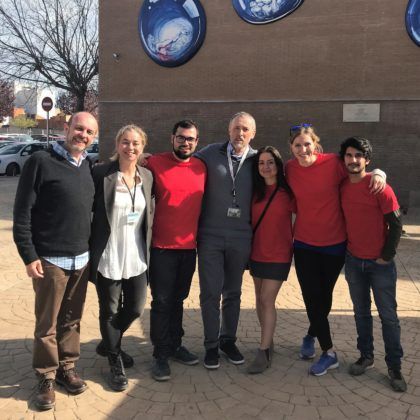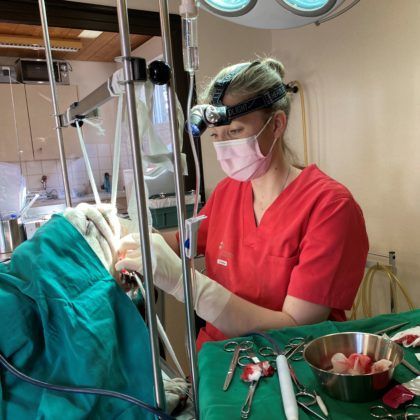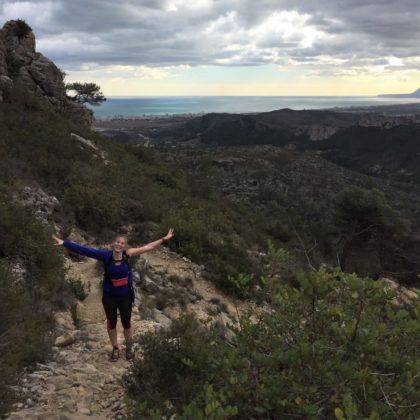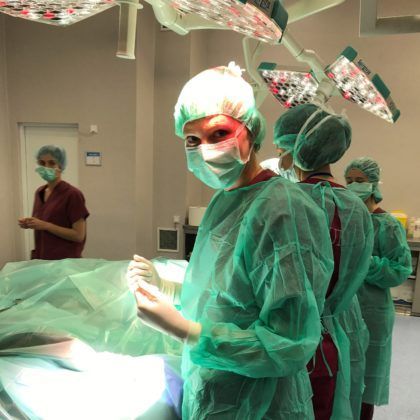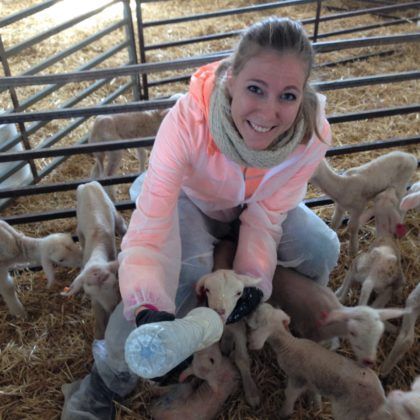Éline Trambelland is French, she studied in Spain between 2013 and 2018 and has ended up working as a vet in Switzerland. For some, it might seem a surprising career path, but it is not an unusual one for our international graduates, with CEU alumni now working all over the world.
For her office in her own veterinary clinic, Dr Trambelland returned to the University via the wonders of the internet to talk to prospective CEU students from France about her experiences here. There was an interchange of opinions and she was able to share her experiences and a few career tips for France and Switzerland. But we want to know more about her!

Éline, many recent graduates talk about the importance of networking. You were the student representative for your faculty while at the University. What initiatives did you set up during this period?
Being the student representative was one of the best experiences I had at the University! Being a representative means that you have a lot of responsibilities, but it also gives you the opportunity to get to know the University better, to meet people from different groups and years, and also to develop your skills.
I was the representative for fifth-year students and also the general representative for the faculty. That gave me the opportunity to develop skills such as leadership and teamworking and important aptitudes such as empathy and patience.
During this period, with the help of the faculty I organized a Veterinary Day, which included an animal talent contest open to all students at the faculty. That day was a great success and I hope keep doing it in the future.
I’d encourage students to take part in and organize events at the University, as CEU puts a lot of resources at your disposal to improve the student experience and integration. For example, if you like cycling, then you can easily start a cycling club, take part in competitions, and so on. And the same goes if your interest is in reading, film, marine animals, or whatever.
The students at the university are really lucky! If you’ve got a good idea and the will to make it happen, there’s a lot of help available for organization, money, materials, and so on.
So, although going to lectures is an important part of being at University, there’s a lot going on away from lectures. Tell us about some of the activities you took part in as a student.
During my degree, I attended conferences about exotic animals and animal welfare. I went to a lot of talks and I learnt a lot and met new people – people who shared my interest in certain areas of veterinary science.
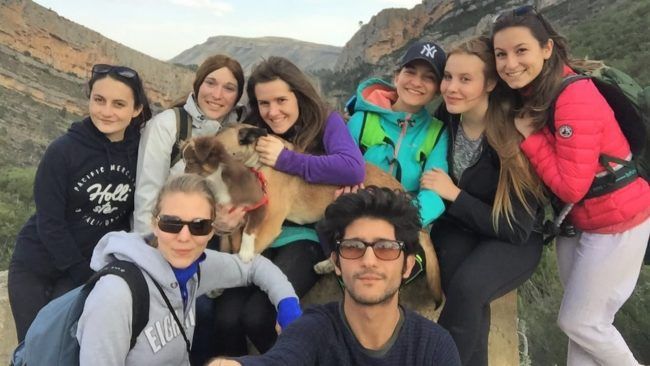
When you came to Spain, you knew virtually no Spanish. Then you had a bit of a strange experience with a neighbour soon after arriving – who later became a good friend of yours. How would you describe those first few months of adapting to a new city, a new environment and a culture which was similar to your own, but still not the same?
The first few months were quite easy really, because during the welcome week I met a few other girls who went on to become my best friends and one of them has even become a colleague.
I’m quite adaptable, so I soon found out where to go running, where to go out, and what there was to see and do in Valencia: life in Spain is so great that it’s hard not to have a good time!
In my experience, I don’t remember any international student who came to Spain and then wanted to leave. The only people who left were those who didn’t really concentrate on their studies or those who realized they’d chosen the wrong degree.
Could you tell us a bit about what you learnt at the University and which you now use in your day-to-day work as a vet in Switzerland?
My experience as a representative was a real joy: I was able to organize events, deal with problems, and learn what management is all about when you’ve got responsibility. I really appreciate that opportunity, because now I’m the boss at the clinic I’m working at. At just 27 years old but with that experience as a representative, I’ve got the skills I need to deal with responsibility and manage staff.
It’s thanks to that experience that I’ve got more self-confidence and I know that there is a solution to every problem: you’ve just got to look for it.
Veterinary Medicine: a real vocation
How would you convince someone who’s about to come to the Faculty of Veterinary Medicine that this really is the profession for them?
GO FOR IT! What we do as veterinarians is more than just a job. It’s a real vocation and generally someone who wants to be a vet has had this desire since childhood.
There are so many advantages to studying in Valencia. You’re going to live in Spain, and all around you you’ve got the beach, mountains, sport, good weather, and prices are lower in comparison with France. And then you’ve got a great opportunity to learn a new language, discover a new culture, and experience Fallas! And then the University is committed
to boosting the social side of things for students, while giving them professional opportunities and supporting their projects.
And even if you’re missing home a bit, the airport is only 15 minutes away by car or 45 minutes by metro!
So, for me, the question is ‘why would you not want to do this?’ If you really want to be a vet, there’s an incredible opportunity here and everything is in place for you to make a success out of it: I know of students who had the chance to choose between a place at a veterinary faculty in France and here in Spain, and they chose to come here.
What does the future hold for your career in Switzerland? Are you thinking about specializing or taking your career in a different direction?
Since I was a child, I’d always wanted to be a veterinarian, especially a surgeon. That’s why I thought about doing an internship, an extraordinary but difficult experience, and then a residency.
When I finished my internship, I’d lost my motivation to do a residency. To specialize, you have to do a three-year residency focused on scientific research, work very hard and study very specialized publications. You need a high level of personal motivation and commitment.
In the end, I did a master’s in surgery and I think that’s enough for me. I really like to be versatile: to do abdominal ultrasounds, surgery, internal medicine, oncology, dealing with exotic animals, etc. Right now, I’m doing some training in ultrasound and I learn every day from the clinical cases that I see.
I still have an open mind about things, because when you graduate, you think you know exactly the direction you want to take for your career, but then the reality of the profession imposes itself and things can take a different course. Just in the case of the people I know, three of us wanted to do a residency and specialize in surgery: in the end, I did my master’s and I’m working as a vet in Switzerland, another is focusing on internal medicine and then the other is preparing for the exam to work as a vet in an abattoir.




